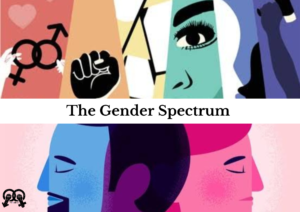Performativity is the concept that language can function as a form of social action and have the effect of change. The concept has multiple applications in diverse fields such as anthropology, social and cultural geography, economics, gender studies (social construction of gender), law, linguistics, performance studies, history, management studies and philosophy.
In the realm of gender studies and philosophy, Judith Butler’s performativity theory stands as a groundbreaking and influential concept. Introduced in her seminal work, “Gender Trouble: Feminism and the Subversion of Identity,” the theory challenges the traditional understanding of gender as a static, inherent quality and instead proposes that gender is a socially constructed and performative act.
Butler’s theory draws inspiration from the work of philosopher John Langshaw Austin, who introduced the concept of performative utterances – speech acts that not only describe or state something but also bring about the thing they describe. For instance, the pronouncement “I pronounce you husband and wife” does not merely describe a marital status; it actively creates that status.
Building on Austin’s ideas, Butler argues that gender similarly operates as a performative act. We do not simply possess an innate gender identity; rather, we construct and express our gender through our actions, behaviours, and social interactions. This ongoing performance of gender is shaped by societal norms, expectations, and cultural scripts.
Similarly for instance, when a judge declares a couple married, their words act as creating a legal and social union. Similarly, Butler argues that gender performances function similarly, bringing into existence the gender identities we claim. This view was also influenced by philosophers such as Michel Foucault and Louis Althusser.
Performance theory and gender perspectives
According to Butler, our gender performances are not always conscious or deliberate. We often conform to gender norms without explicitly thinking about it, as we have internalized these norms through socialization and exposure to media, language, and social interactions. However, Butler also emphasizes that we have agency in our gender performances, and we can subvert or challenge gender norms through our actions.
One of the key implications of Butler’s theory is that there is no fixed or essential gender identity. Instead, gender is fluid and ever-changing, as it is constantly being renegotiated and redefined through our performances. This challenges the traditional binary understanding of gender as either male or female and opens up the possibility for a more diverse range of gender identities and expressions.
Theoretical criticisms
Critics of Butler’s concept of performativity argue that it is individualistic and overlooks factors such as the space, others involved, and how others might interpret what they witness. The unplanned effects of the performance act and the contingencies surrounding it are also overlooked. The concept of the subject is unclear, with some arguing that Butler’s writings may be better suited to literary analysis than social theory. Critics also argue that Butler reinvents ethnomethodological and symbolic interactionist sociological analyses of gender in the concept of performativity. Green (2007) argues that Butler builds on the work of Kessler and McKenna (1978) and West and Zimmerman (1987) by deconstructing gender into moments of attribution and iteration in a continual social process of “doing” masculinity and femininity in the performative interval. Butler builds on this notion of gender’s constructed nature to enhance the frames of analysis for recognizing and understanding marginalized and oppressed identities and groups.
Despite these criticisms, Butler’s performativity theory remains an influential and widely debated concept in gender studies. It has helped to shape our understanding of gender as a complex and fluid construct, and it continues to inspire scholars and activists to challenge gender norms and advocate for greater gender equality.
Authorship Credits
Ojaswini Rao Ayde is a second-year Economics student at Miranda House and a Research Intern at Mandonna
Graphics Credits
Prapti is a first-year Sociology student at Maitreyi College and a Graphics Intern at Mandonna





